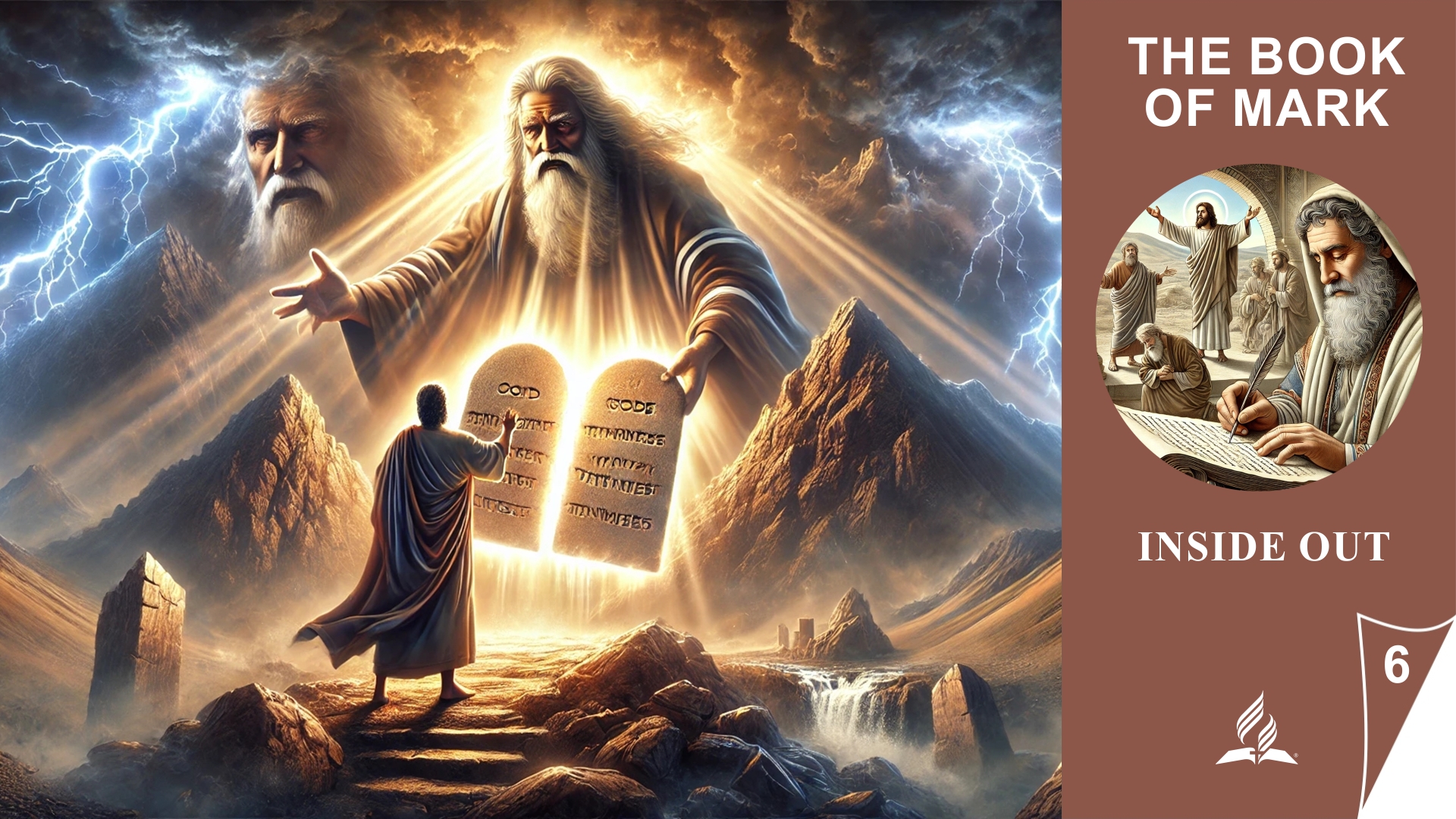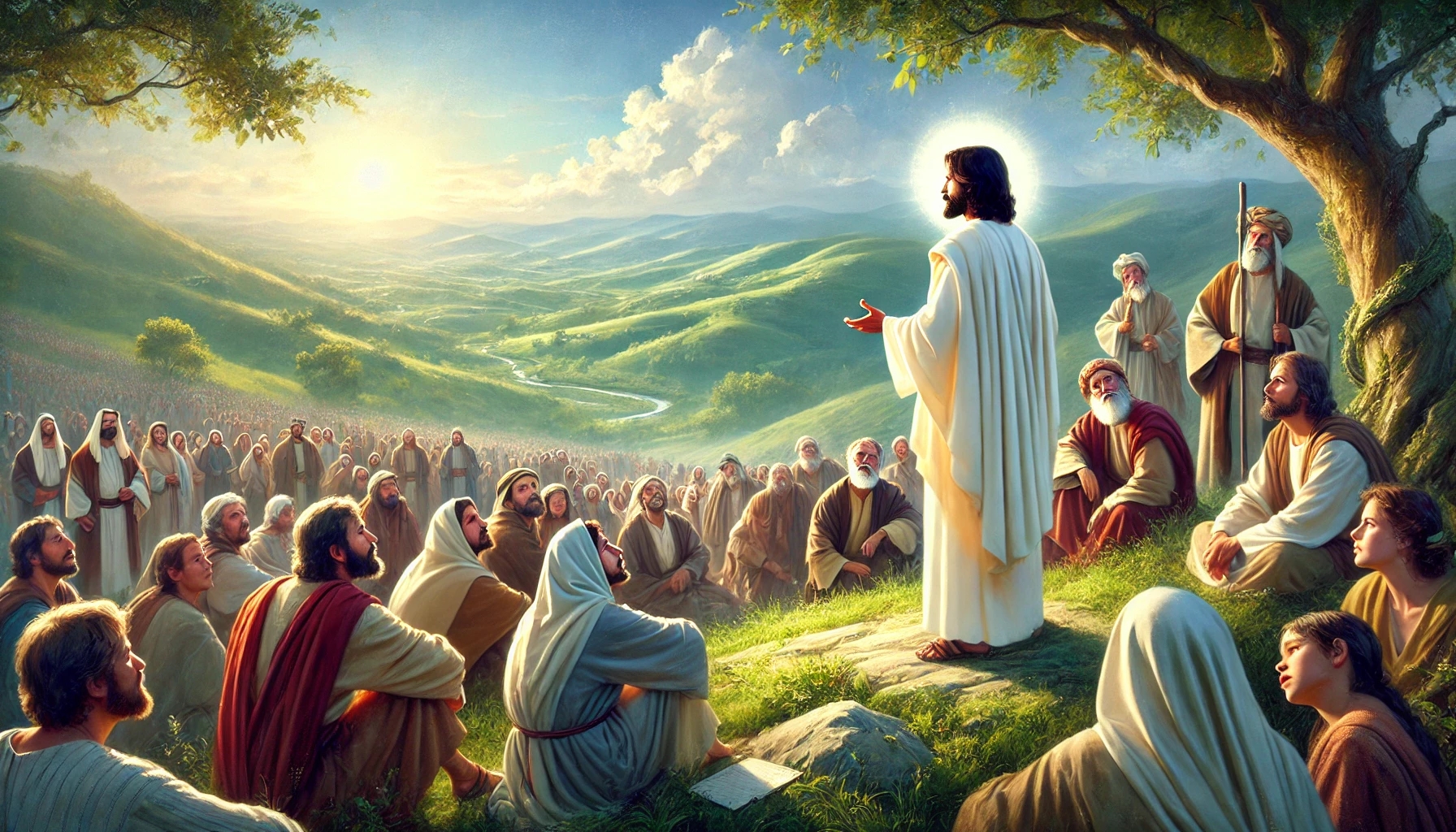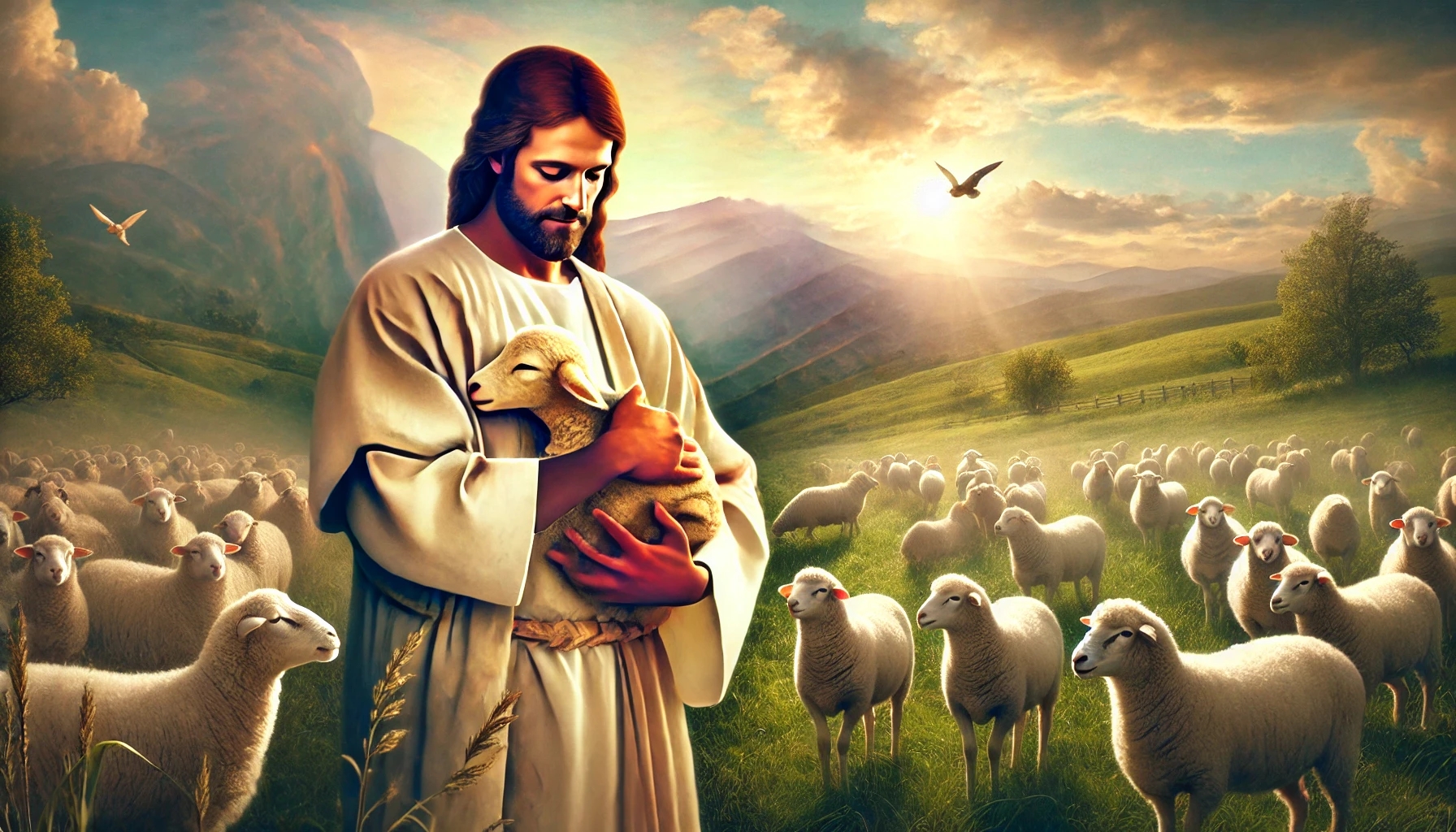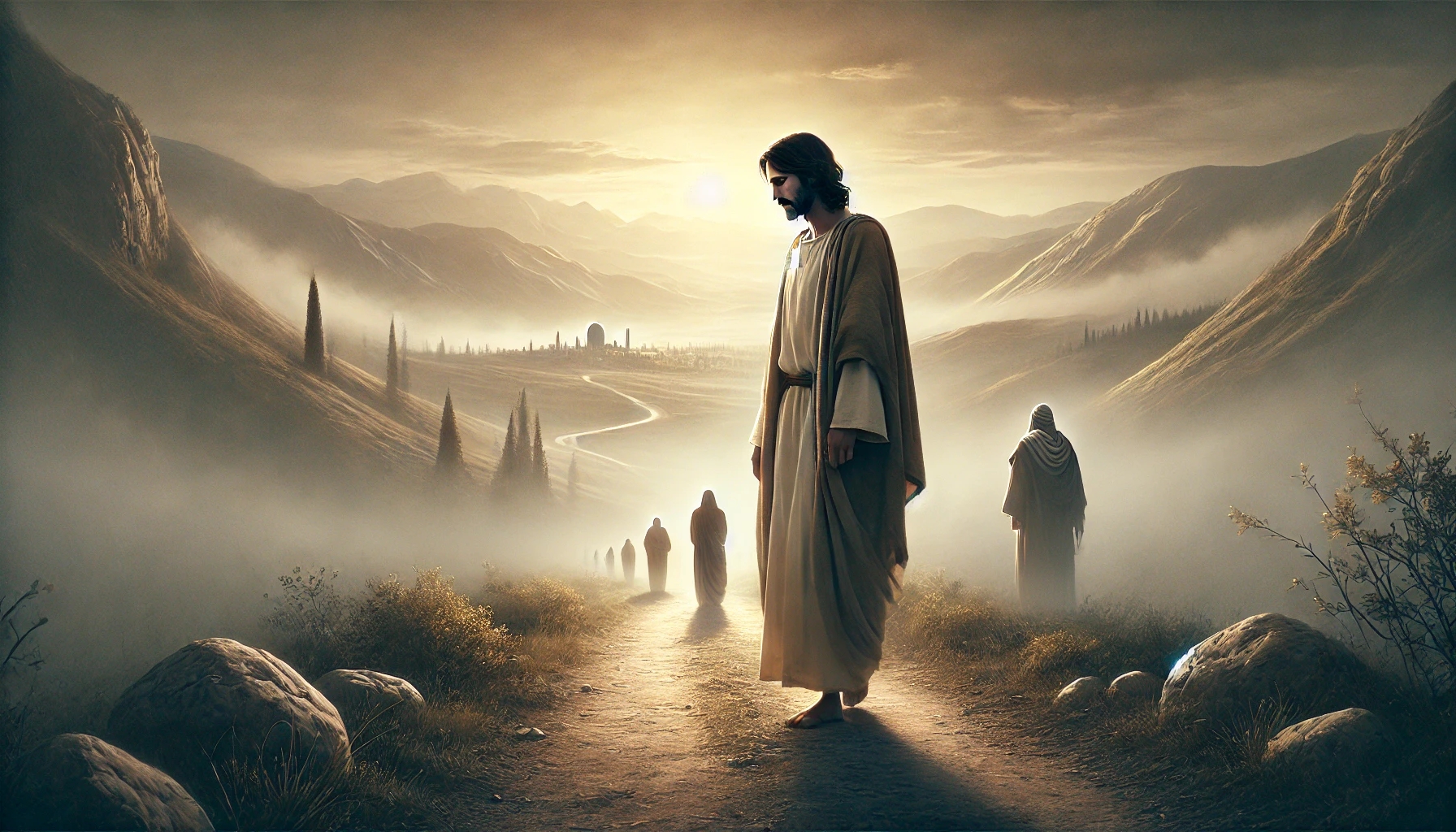Witness the surprising power of radio in transforming lives in Argentina. Unbelievable, yet true!
#RadioRevolution #FaithTransformation #ArgentinaAwakening #AWRImpact #ArgentinaFaithJourney #awr #adventistworldradio About our channel
We are Adventist World Radio, dedicated to sending the gospel to every corner of the world, even in the most remote and inaccessible locations. Through radio broadcasts, Cell Phone Evangelism, Godpods, and Digital Evangelism on various social media platforms, we're striving to reach millions across the world in their native languages. Since we started broadcasting back in 1975, we've seen and heard some truly inspirational stories of people who've experienced life-changing encounters with God. Regardless of their beliefs or professions, we have seen God reach a pagan chieftain, a witch, a professional assassin, and even rebels. Witness God’s work at AWR, from broadcast to baptism. #short Source: https://www.youtube.com/watch?v=MSWi9QRBpx4
Salmo 95:7 – Domenica 4 agosto 2024
“Poiché egli è il nostro Dio; e noi siamo il popolo di cui ha cura, e il gregge che la sua mano conduce.” (Salmo 95:7) Meditazione giornaliera “Apri la porta del tuo cuore”. Rubrica a cura di Anna Cupertino. Speaker: Alessio Caratelli Source: https://www.youtube.com/watch?v=rSAqPynGAZc
Lesson 6.Inside Out | 6.1 Human Traditions Versus God’s Commandments | THE BOOK OF MARK | LIVING FAITH


Lesson 6.Inside Out
God’s Commandments Over Traditions: The True Source of Purity and Faith
In this lesson, we are confronted with the fundamental question: What is true faith, and what does it mean to be truly pure before God? Jesus demonstrated through His teachings and actions that true purity and genuine faith are not achieved through external rituals or human traditions, but through a heart that is fully aligned with God’s will.
We will examine how Jesus criticized the Pharisees for their emphasis on human traditions over divine commandments and how He defined true purity as something that comes from within. We will also look at the story of the Syrophoenician woman, which teaches us that faith knows no boundaries and that God’s grace is available to all who come to Him in humility.
Furthermore, we are warned to beware of the “leaven of the Pharisees” – a metaphor for false teachings and influences that can poison our faith. The lesson calls us to remain spiritually vigilant, not to be distracted by superficial worries or false doctrines, and to place our trust in God’s provision, even in seemingly difficult times.
This lesson invites us to examine our own lives and faith to ensure that we do not fall into the trap of hypocrisy and self-deception, but rather live a life rooted in God’s truth and love.
6.1 Human Traditions Versus God’s Commandments
True Piety: God’s Commandments Over Human Traditions
Read Mark 7:1–13. What important lessons are highlighted here?
The passage in Mark 7:1–13 deals with a central theme concerning the confrontation between human traditions and divine commandments. Jesus uses this opportunity to point out the deeper issues underlying the religious practices and traditions of that time.
The religious leaders confront Jesus with the question of why his disciples do not follow the tradition of hand washing. Jesus responds by pointing out a fundamental flaw: people have begun to place their own traditions and rules above the commandments of God. He quotes Isaiah to show that it is possible to honor God outwardly while the heart is far from Him. This discrepancy between outward appearance and inner reality is not only problematic for Jesus but also represents a form of hypocrisy.
Jesus particularly emphasizes the practice of circumventing the commandment to honor one’s parents through a religious tradition. This tradition allowed people to declare financial resources as “corban,” meaning they were dedicated to the temple. These resources were then no longer available to support one’s own parents, which was in direct opposition to the divine commandment.
Jesus’ clear message is that God’s word must always take precedence over human traditions. The Pharisees’ insistence on external rituals such as hand washing as a sign of purity is rejected by Jesus, as true purity and alignment with God’s will are found in the heart and in obedience to His commandments, not in the blind observance of inherited rituals. Jesus thereby sets a clear priority: divine commandments take precedence over human traditions, especially when the latter contradict the former.
Could it be that we have some “traditions” that might contradict the principles of God’s law? If so, what might they be?
Yes, it is quite possible that there are religious or societal traditions today that contradict the principles of God’s law. Here are some examples:
-
Ritualism over true worship: In some faith communities, rituals and traditions, such as specific prayers or services, may become so prominent that they seem more important than an inner relationship with God. When the focus is more on fulfilling external rites than on the condition of the heart, this can stand in opposition to the command of sincere worship.
-
Cultural practices over biblical principles: In many cultures, there are traditions that may conflict with biblical principles. For example, societal norms that place power, wealth, or status above all else can contradict the biblical principles of humility, love for others, and justice.
-
Materialism and consumerism: In our modern society, great value is often placed on material possessions and consumption. This tradition can be at odds with God’s commandments, which emphasize generosity, simplicity, and caring for the needy. The pursuit of wealth and possessions can easily become a priority that pushes spiritual values into the background.
-
Family and societal structures: There are traditions in families and societies that undermine the equality and dignity of all people as taught in the Bible. For example, patriarchal traditions that view women or children as less valuable may contradict the biblical principles of equality and love for all people.
-
Laws and norms that hinder charity: There are legal or social traditions that may conflict with the commandment of charity. For example, bureaucratic obstacles or social prejudices may prevent people in need from receiving the help that they are entitled to according to the principles of the Bible.
-
Traditional views on forgiveness and reconciliation: In some cultures, there are traditions that promote revenge or holding on to hostilities. This is in opposition to the biblical commandments of forgiveness and reconciliation.
It is important for believers to regularly examine their traditions and practices in the light of biblical teachings to ensure that they do not inadvertently fall into the error of placing human traditions above God’s commandments, as Jesus criticized in Mark 7:1–13.
The teachings from Mark 7:1–13 and the discussion on human traditions versus God’s commandments have a deep connection to our daily lives and faith. They challenge us to question and examine our own traditions, habits, and practices to see if they truly align with the principles and commandments of God.
Connection to Our Daily Lives:
-
Authenticity in worship: In our daily lives, it is easy to focus on religious rituals or traditions without examining our hearts and our inner relationship with God. The challenge is to ensure that our worship is not only external but comes from a sincere heart that truly seeks God’s will.
-
Setting priorities: The teaching reminds us that God’s commandments should always take precedence over cultural or societal norms. In a world that often emphasizes material success, status, or power, we are called to align our priorities with biblical values—such as humility, love for others, and justice.
-
Self-examination and reflection: It is important to regularly reflect on and examine whether there are traditions or habits in our lives that contradict God’s commandments. This self-examination helps us stay spiritually vigilant and avoid the trap of hypocrisy, where outward piety seems more important than the heart.
-
Living forgiveness and reconciliation: The call to place biblical principles like forgiveness and reconciliation above cultural traditions of revenge or hostility has direct implications for our relationships in everyday life. We are called to seek peace and reconciliation, even when it goes against cultural or family traditions.
Connection to Our Faith:
-
God’s Word as the standard: The story in Mark shows that God’s Word is the highest standard for our lives. In our faith, we should always strive to place God’s commandments above human traditions or interpretations. This requires deep study of the Bible and the willingness to align our lives with it.
-
Spiritual vigilance: The warning against replacing divine commandments with human traditions calls us to spiritual vigilance. It encourages us to always seek God’s will in our faith life and to critically examine human traditions.
-
Community and teaching: In our faith community, it is important that we encourage one another to place God’s commandments at the center. Teachings and practices should be regularly examined in the light of Scripture to ensure that they truly align with what God requires of us.
In summary, this passage calls us to place God’s commandments above human traditions in both our personal lives and our faith. This alignment helps us to live authentically, take our faith seriously, and place God’s principles first in all areas of our lives.

Always place God’s commandments above human traditions, for true piety springs from a sincere heart that seeks His will.
4.08.2024 – Matthew Chapter 5 | BELIEVE HIS PROPHETS
August 4, 2024
DAILY BIBLE READING – Matthew Chapter 5
1 And seeing the multitudes, he went up into a mountain: and when he was set, his disciples came unto him:
2 And he opened his mouth, and taught them, saying,
3 Blessed are the poor in spirit: for theirs is the kingdom of heaven.
4 Blessed are they that mourn: for they shall be comforted.
5 Blessed are the meek: for they shall inherit the earth.
6 Blessed are they which do hunger and thirst after righteousness: for they shall be filled.
7 Blessed are the merciful: for they shall obtain mercy.
8 Blessed are the pure in heart: for they shall see God.
9 Blessed are the peacemakers: for they shall be called the children of God.
10 Blessed are they which are persecuted for righteousness’ sake: for theirs is the kingdom of heaven.
11 Blessed are ye, when men shall revile you, and persecute you, and shall say all manner of evil against you falsely, for my sake.
12 Rejoice, and be exceeding glad: for great is your reward in heaven: for so persecuted they the prophets which were before you.
13 Ye are the salt of the earth: but if the salt have lost his savour, wherewith shall it be salted? it is thenceforth good for nothing, but to be cast out, and to be trodden under foot of men.
14 Ye are the light of the world. A city that is set on an hill cannot be hid.
15 Neither do men light a candle, and put it under a bushel, but on a candlestick; and it giveth light unto all that are in the house.
16 Let your light so shine before men, that they may see your good works, and glorify your Father which is in heaven.
17 Think not that I am come to destroy the law, or the prophets: I am not come to destroy, but to fulfil.
18 For verily I say unto you, Till heaven and earth pass, one jot or one tittle shall in no wise pass from the law, till all be fulfilled.
19 Whosoever therefore shall break one of these least commandments, and shall teach men so, he shall be called the least in the kingdom of heaven: but whosoever shall do and teach them, the same shall be called great in the kingdom of heaven.
20 For I say unto you, That except your righteousness shall exceed the righteousness of the scribes and Pharisees, ye shall in no case enter into the kingdom of heaven.
21 Ye have heard that it was said of them of old time, Thou shalt not kill; and whosoever shall kill shall be in danger of the judgment:
22 But I say unto you, That whosoever is angry with his brother without a cause shall be in danger of the judgment: and whosoever shall say to his brother, Raca, shall be in danger of the council: but whosoever shall say, Thou fool, shall be in danger of hell fire.
23 Therefore if thou bring thy gift to the altar, and there rememberest that thy brother hath ought against thee;
24 Leave there thy gift before the altar, and go thy way; first be reconciled to thy brother, and then come and offer thy gift.
25 Agree with thine adversary quickly, whiles thou art in the way with him; lest at any time the adversary deliver thee to the judge, and the judge deliver thee to the officer, and thou be cast into prison.
26 Verily I say unto thee, Thou shalt by no means come out thence, till thou hast paid the uttermost farthing.
27 Ye have heard that it was said by them of old time, Thou shalt not commit adultery:
28 But I say unto you, That whosoever looketh on a woman to lust after her hath committed adultery with her already in his heart.
29 And if thy right eye offend thee, pluck it out, and cast it from thee: for it is profitable for thee that one of thy members should perish, and not that thy whole body should be cast into hell.
30 And if thy right hand offend thee, cut it off, and cast it from thee: for it is profitable for thee that one of thy members should perish, and not that thy whole body should be cast into hell.
31 It hath been said, Whosoever shall put away his wife, let him give her a writing of divorcement:
32 But I say unto you, That whosoever shall put away his wife, saving for the cause of fornication, causeth her to commit adultery: and whosoever shall marry her that is divorced committeth adultery.
33 Again, ye have heard that it hath been said by them of old time, Thou shalt not forswear thyself, but shalt perform unto the Lord thine oaths:
34 But I say unto you, Swear not at all; neither by heaven; for it is God’s throne:
35 Nor by the earth; for it is his footstool: neither by Jerusalem; for it is the city of the great King.
36 Neither shalt thou swear by thy head, because thou canst not make one hair white or black.
37 But let your communication be, Yea, yea; Nay, nay: for whatsoever is more than these cometh of evil.
38 Ye have heard that it hath been said, An eye for an eye, and a tooth for a tooth:
39 But I say unto you, That ye resist not evil: but whosoever shall smite thee on thy right cheek, turn to him the other also.
40 And if any man will sue thee at the law, and take away thy coat, let him have thy cloak also.
41 And whosoever shall compel thee to go a mile, go with him twain.
42 Give to him that asketh thee, and from him that would borrow of thee turn not thou away.
43 Ye have heard that it hath been said, Thou shalt love thy neighbour, and hate thine enemy.
44 But I say unto you, Love your enemies, bless them that curse you, do good to them that hate you, and pray for them which despitefully use you, and persecute you;
45 That ye may be the children of your Father which is in heaven: for he maketh his sun to rise on the evil and on the good, and sendeth rain on the just and on the unjust.
46 For if ye love them which love you, what reward have ye? do not even the publicans the same?
47 And if ye salute your brethren only, what do ye more than others? do not even the publicans so?
48 Be ye therefore perfect, even as your Father which is in heaven is perfect.
King James Version. Public Domain

Commentary
Introduction:
Matthew Chapter 5, also known as the Sermon on the Mount, is a central passage in the teachings of Jesus. Here, Jesus presents the way to a life focused on the values of the Kingdom of Heaven. Beginning with the Beatitudes, He offers profound teachings on the true nature of happiness and fulfillment, which are found not in material things, but in spiritual virtues and right relationships with God and others. The Sermon on the Mount challenges listeners to examine their hearts and strive for a higher righteousness that goes beyond mere legal compliance.
Commentary:
In Matthew Chapter 5, Jesus lays the foundation for a way of life that is radically different from worldly norms. The Beatitudes represent a reversal of worldly values, promising the Kingdom of Heaven and comfort to the spiritually poor, the mourners, the meek, and the persecuted. Jesus calls His disciples to be the “salt of the earth” and the “light of the world,” to live as examples of God’s grace and truth.
Jesus does not abolish the law but fulfills and expands it by pointing to the deeper intent behind the commandments. For example, He teaches that the roots of murder lie in anger and that adultery begins with a lustful look. These teachings emphasize that true righteousness begins in the heart, not just in outward actions.
A central point of this teaching is the love of enemies, which stands in stark contrast to typical human reactions. Jesus calls for loving not only one’s neighbors but also one’s enemies, doing good instead of repaying evil, and praying for those who persecute us. This attitude reflects the perfection that Jesus calls His followers to—a perfection that aligns with the character of God.
Summary:
Matthew Chapter 5 reveals the ethical and moral principles of the Kingdom of Heaven that Jesus teaches His followers. The Beatitudes extol spiritual virtues and promise eternal rewards for those who follow God’s path. Jesus urges believers to act as light and salt in the world and to live a righteousness that goes deeper than mere adherence to laws. Through teachings on anger, adultery, retaliation, and love for enemies, He calls us to examine our hearts and align our lives with God’s perfect standards. These teachings are an invitation to live in a way that reflects the character of God and prepares us for eternal life.
![]()

WEEKLY SPIRIT OF PROPHECY READING – Ellen White | The Desire of Ages Chapter 52: The Divine Shepherd
This chapter is based on John 10:1-30.
Read online here
Commentary
In John 10:1-30, Jesus Christ reveals Himself as the “Good Shepherd,” a metaphor deeply rooted in the culture and hearts of the people of His time. This familiar image of a shepherd lovingly and protectively watching over his flock serves as a powerful parable for the close, personal relationship that Jesus maintains with His believers. He is not just a shepherd, but the Shepherd who is willing to lay down His life for His sheep—an expression of the highest form of love and devotion.
The promise that the Good Shepherd knows His sheep by name highlights the deep personal bond that Jesus has with each individual believer. He knows our worries, our fears, and our struggles. In a world full of uncertainties, the Good Shepherd offers security, guidance, and comfort. Jesus contrasts Himself sharply with the false shepherds of His time, who led the people astray and neglected their responsibility to the flock.
Through the image of the shepherd who goes ahead and leads his sheep to safe pastures, Jesus illustrates that the way to God cannot be reached through human wisdom or religious systems, but only through Him. He is the door to life, and only through Him can we find true fulfillment and peace. This image of the Shepherd who fights for and protects His sheep conveys the deep comfort and security found in following Jesus.
The Good Shepherd not only lays down His life for the sheep but also takes it up again to grant them eternal life. This willingness to sacrifice Himself shows the deep love of Jesus, a love that knows no bounds. It is a love that follows us into our darkest moments, rescues us from lostness, and leads us into fellowship with God.
Jesus’ call to follow His voice is an invitation to a life of abundance—a life characterized by His guidance and care. In Him, we find not only protection and provision but also the assurance that He will never abandon us. This Shepherd, who leads us through life, will ultimately bring us to our eternal home, where we will find complete security and joy in His presence.

WEEKLY SPIRIT OF PROPHECY READING – Ellen White | The Desire of Ages Chapter 53: The Last Journey From Galilee
This chapter is based on Luke 9:51-56; Luke 10:1-24.
Read online here
Commentary
In Chapter 53 the final journey of Jesus from Galilee to Jerusalem is depicted, a journey marked by both internal and external challenges. With the foreknowledge of His impending suffering and death, Jesus altered His approach, deliberately turning toward the cross. Whereas He had previously avoided the attention of the masses, He now openly presented Himself, preparing the people for the impending climax of His earthly mission.
On this last journey through Galilee, Jesus taught intensively, using many parables to convey His message and prepare His disciples for the coming events. Despite the growing hostility from the religious leaders, Jesus remained steadfast in His mission, resolutely setting His face toward Jerusalem, fully aware that His sacrifice was necessary to save humanity.
The people’s reactions to Jesus’ final journey were mixed. While some readily accepted His teachings, others met Him with rejection and hostility. The Samaritans, who did not receive His message, and the cities that ignored His works and teachings, became cautionary examples of the danger of rejecting God’s offer of salvation.
This chapter highlights Jesus’ determination and obedience to the will of His Father, as well as His deep love and care for humanity. It shows us that the path of obedience and devotion is not always easy, but it ultimately leads to the fulfillment of God’s divine plan. The words and actions of Jesus on this final journey remind us that the true treasure lies in heaven and that if we set our hearts on God, we can become part of His eternal kingdom.
Source: https://fulfilleddesire.net/4-08-2024-matthew-chapter-5-believe-his-prophets/


